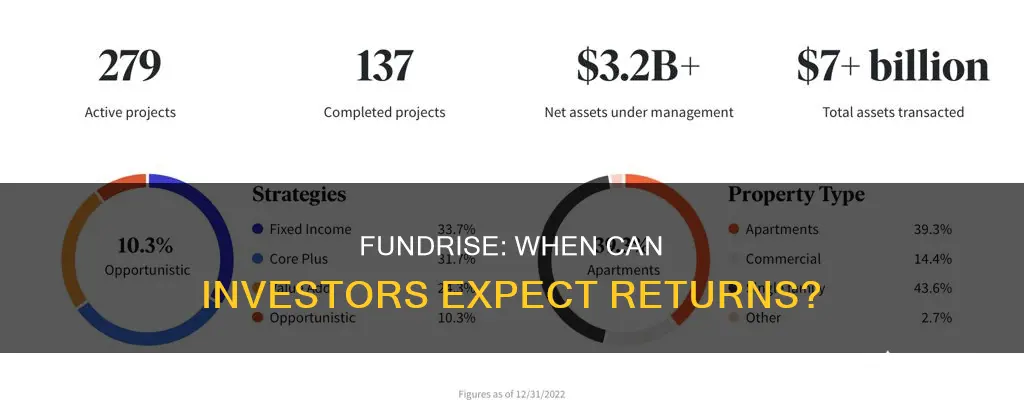
Fundrise is an online real estate investment platform that allows users to invest in private real estate deals with a minimum investment of just $10. The platform offers several investment plans, including Supplemental Income, Long-Term Growth, and Venture Capital, each with different risk profiles and financial goals. While Fundrise offers the potential for high returns, it is important to note that investments are illiquid and may be subject to a 1% early withdrawal penalty. The platform is best suited for investors with a long-term outlook who are seeking diversification outside of traditional stocks and bonds and are willing to do their due diligence in understanding the risks.
| Characteristics | Values |
|---|---|
| Minimum Investment | $10 |
| Open to | All investors |
| Investment Types | Real estate, private credit, venture capital |
| Investment Options | Auto-diversified portfolios, Fundrise Pro, Fundrise iPO |
| Investment Plans | Supplemental Income, Long-Term Growth, Balanced Investing, Venture Capital |
| Returns | Quarterly dividends, appreciation in asset value |
| Annual Returns | Between -7.45% and 22.99% from 2017 to 2023 |
| Fees | 0.85% annual asset management fee, 0.15% annual advisory fee |
| Withdrawal | Submit a liquidation request |
| Early Withdrawal Fee | 1% penalty for withdrawing eREIT/eFund shares held for less than 5 years |
What You'll Learn

Fundrise's fees and costs
Fundrise charges an all-in 1% management fee, which includes an annual asset management fee of 0.85% and an annual advisory fee of 0.15%. The advisory fee can be waived in certain circumstances.
There is also a range of other fees that may be incurred, including:
- A 0-2% acquisition fee when Fundrise buys a new asset.
- A 1% penalty when you redeem shares within five years of investing (with no fee in the first 90 days).
- An annual fee of $125 to Millennium Trust Company if you're investing as an IRA.
- Specific funds may have additional fees, including asset management, acquisition, and servicing fees.
Fundrise Pro, which gives investors more control over their portfolio, is available for an additional $10 per month or $99 per year, with a 30-day free trial.
Commodities: Invest Now or Later?
You may want to see also

The risks of investing in non-publicly traded funds
Investing in non-publicly traded funds, such as non-traded mutual funds or real estate investment trusts (REITs), carries several risks that investors should be aware of. Here are some key risks to consider:
- Lack of Liquidity: Non-publicly traded funds are often illiquid, meaning it may be challenging to sell or redeem shares. These funds are not traded on public exchanges, and there may be limited buyers. Some funds have lock-up periods or restrictions on early redemptions, potentially making it difficult to access your invested funds when needed.
- Higher Fees: These types of funds typically have higher fees compared to publicly traded alternatives. The fees associated with non-publicly traded funds may include asset management fees, advisory fees, development fees, and liquidation fees. These fees can impact overall investment returns and are not always easily accessible or transparent.
- Limited Disclosure and Transparency: Non-publicly traded funds may provide less transparency and disclosure about their investment strategies, underlying assets, and management practices. Investors may receive limited insight into how these funds are managed, making it challenging to fully understand the risks involved.
- Risk of Higher Returns: Non-publicly traded funds are often marketed to wealthy, accredited investors because they can carry higher risks and potentially offer higher returns. The higher risk nature of these investments means there is a greater possibility of losing money or experiencing negative returns.
- Less Regulation: Non-publicly traded funds are subject to fewer regulations compared to publicly traded funds. This reduced regulatory oversight can increase the potential for higher risks and less protection for investors.
- Volatility and Market Risk: Non-publicly traded funds, particularly those focused on alternative assets like real estate or credit, may be more vulnerable to market volatility. During periods of economic uncertainty or downturns, these funds may suspend or delay redemptions, limiting your ability to access your invested funds.
It is essential for investors to carefully consider these risks before investing in non-publicly traded funds. Conducting thorough due diligence, understanding all fees and potential risks, and ensuring that the investment aligns with your financial goals and risk tolerance is crucial.
The Great Debate: Home Sweet Home or Retirement Nest Egg?
You may want to see also

The benefits of investing in real estate
Investing in real estate can be a great way to diversify your portfolio and build long-lasting wealth. Here are some benefits of investing in real estate:
Diversification
Real estate has a low correlation with other major asset classes like stocks and bonds. Adding real estate to your portfolio can lower risk and provide a higher return per unit of risk. It can also act as a hedge against market volatility.
Steady Income
One of the most appealing aspects of investing in real estate is the potential for a steady stream of rental income. Whether you invest in residential or commercial properties, rental income can provide a consistent cash flow that can be used to cover expenses or reinvested in more properties.
Appreciation
While there are no guarantees, owning property often leads to long-term capital appreciation. This can result in significant gains when it's time to sell your investment. Real estate properties typically appreciate over time, increasing an investor's profits, especially with long-term investments.
Tax Benefits
Real estate investors can take advantage of various tax incentives, breaks, and deductions, such as deducting mortgage interest, depreciation, and the cost of running the business. Additionally, if you hold onto your property for an extended period, you may qualify for capital gains tax exemptions.
Building Capital and Equity
As you pay down a property mortgage, you build equity, increasing your net worth. Building equity allows you to leverage that money to buy more properties, increase cash flow, and build even more wealth.
Inflation Hedge
Real estate provides a hedge against inflation as its prices typically increase with inflation rates. This allows your investment to keep pace with inflation, retaining the power of your dollar.
Control and Involvement
Real estate investing allows you to have a more hands-on approach compared to other investments. You can choose to manage the property yourself or hire a property management company, depending on your desired level of involvement and cost.
Generational Investment
A real estate investment can become a generational asset if passed down to heirs, creating financial stability for future generations. Many investors start a family business by creating an LLC to own and operate real estate investment properties.
Ownership, Influence, and Trust
You may want to see also

The different investment plans
Fundrise offers four investment plans with different asset allocations depending on your goals. You can change your plan at any time. Here is an overview of the four plans:
Supplemental Income
This plan focuses on properties that create cash flow from rent or interest. You will earn more dividends with this plan, so select it if your goal is passive income.
Long-Term Growth
This plan focuses on properties expected to appreciate in value. You'll earn lower dividends now, but the potential long-term returns could be the highest.
Balanced Investing
This approach creates a more balanced mix of income and growth properties. You earn money through both dividends and appreciation.
Venture Capital
This portfolio invests in high-growth private tech companies (for example, Uber, Unity, and Canva). Returns are expected in the form of long-term appreciation.
In addition to these four plans, Fundrise also offers Fundrise Pro, which allows investors to customise their investment plan and invest in specific funds for $10 per month or $99 per year.
Planning for Independence: Navigating the Path to a Self-Made Retirement
You may want to see also

The redemption process
It's important to note that the shares you've held the longest will be liquidated first, following the first-in-first-out (FIFO) rule. Additionally, there is a 1% penalty fee for redeeming shares that have been held for less than five years, excluding the first 90 days.
The time it takes to complete the redemption process can vary. According to a user on Reddit, it took them about 4-6 weeks to fully cash out. It's also worth noting that Fundrise may suspend or delay redemptions during periods of extreme economic uncertainty, as they did in March 2020 during the economic fallout from the coronavirus outbreak.
Furthermore, there is a risk that your redemption request may not be fully accepted if the market is performing poorly. In such cases, Fundrise might decide to stop redemptions, which could result in your request being cancelled. Therefore, it's important to monitor market conditions and be aware of the potential risks involved in the redemption process.
Oil Investment Calls: Why Me?
You may want to see also
Frequently asked questions
Fundrise is a long-term investment, so you should expect to keep your money in the platform for at least five years. If you choose to cash out early, there may be penalties involved.
Yes, there is a 1% penalty fee for withdrawing eREIT/eFund shares that have been held for less than five years. There are no fees for withdrawing from the Flagship Fund or Income Fund.
To withdraw funds from Fundrise, you need to submit a liquidation request. These requests are reviewed quarterly in early April, July, October, and January. Once approved, you will receive an email, and funds will be disbursed within 6-10 business days.
While you can request to sell your shares back to Fundrise at any time, there is no guarantee that they will repurchase your shares during early redemption periods. Additionally, Fundrise may suspend or delay redemptions during periods of extreme economic uncertainty, as they did in March 2020 during the coronavirus outbreak.
Fundrise may restrict redemptions during periods of economic uncertainty or a real estate market downturn. This means that your ability to withdraw funds may be limited, and you may need to leave your money on the platform until the market improves.







